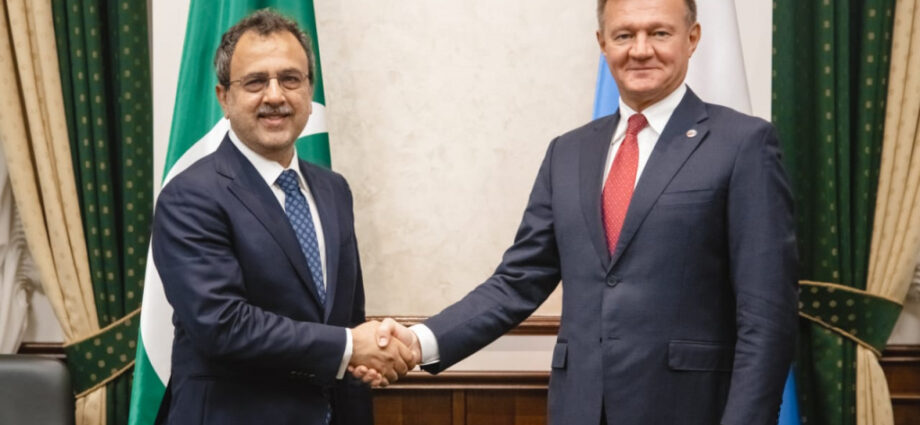

(下边有中文翻译请继续看到底。 谢谢。)
The recently concluded 9th Inter-Governmental Commission (IGC) meeting between Pakistan and Russia in Moscow marks a significant milestone in the bilateral relationship between the two nations. This historic meeting, attended by Pakistan’s Federal Minister for Energy, Sardar Owais Ahmed Leghari, and a high-level delegation, culminated in the signing of eight agreements that span diverse sectors, underscoring the growing convergence of interests between Islamabad and Moscow.
The agreements highlight a shared commitment to fostering mutually beneficial cooperation, particularly in education, trade, industrial development, and health. These developments reflect the evolving nature of Pakistan-Russia relations, which have moved beyond historical perceptions to focus on pragmatic collaboration aimed at addressing contemporary challenges and opportunities.
Educational Collaboration: Building Bridges for Future Generations
One of the most promising outcomes of the IGC meeting was the signing of agreements between Russian educational institutions and Pakistani universities, including COMSATS and Peshawar University. These partnerships aim to facilitate academic exchanges, joint research initiatives, and capacity-building programs, paving the way for enhanced learning opportunities for students and scholars from both countries.
The inclusion of vocational training through a Memorandum of Understanding (MoU) between Pakistan’s National Vocational Technical Institute Commission and Russia’s Karosi University is particularly noteworthy. This initiative underscores the importance of equipping youth with skills aligned with modern industry demands, contributing to sustainable socio-economic development in both nations.
Health Sector Cooperation: A Step Toward Self-Reliance
The agreement for the production of insulin represents a significant stride in Pakistan’s efforts to strengthen its healthcare sector. By leveraging Russian expertise in pharmaceuticals, Pakistan can enhance its capacity to produce life-saving medicines domestically, reducing reliance on imports and improving access to affordable treatments for chronic diseases such as diabetes.
Trade and Industrial Development: Unlocking Economic Potential
Trade and industrial cooperation form the cornerstone of the agreements signed at the IGC. The framework for promoting bilateral trade is expected to boost commerce between the two nations, enabling businesses to explore untapped markets and diversify their export portfolios.
In the industrial sector, the focus on joint ventures and technological collaboration offers immense potential for fostering innovation and driving economic growth. By pooling resources and expertise, Pakistan and Russia can create a dynamic industrial base that supports job creation, enhances productivity, and strengthens competitiveness in the global market.
A Broader Vision for Economic and Strategic Cooperation
The IGC meeting serves as a testament to the shared vision of Pakistan and Russia to deepen their partnership across multiple dimensions. The agreements reflect a strong political will to move beyond transactional engagements and establish long-term cooperation that benefits both nations.
This collaboration also aligns with regional dynamics, as both countries work towards enhancing connectivity and stability in the broader Eurasian region. Russia’s interest in Pakistan’s strategic location and access to emerging markets, coupled with Pakistan’s desire to diversify its partnerships, creates a win-win scenario for both parties.
Achievements and Benefits of Recent Cooperation
Over the past few years, Pakistan and Russia have made significant strides in strengthening their bilateral ties. Beyond the recent agreements signed during the 9th Inter-Governmental Commission meeting, the two countries have already witnessed tangible benefits from their growing collaboration.
In the energy sector, Russia has played a pivotal role in helping Pakistan address its power shortages through investments in the construction of the Kashmir Hydropower Project and the South-North Gas Pipeline. These infrastructure projects not only contribute to Pakistan’s energy security but also facilitate the transportation of natural gas, which is critical to sustaining industrial growth and meeting domestic energy demands.
Additionally, the defense cooperation between the two countries has seen notable advancements. Joint military exercises and exchanges between the Russian and Pakistani armed forces have fostered stronger defense ties and enhanced the capacity of both nations to respond to emerging security challenges in the region.
Trade between Pakistan and Russia has steadily increased, with both countries working to diversify their economic exchanges. The Russian market is opening up to Pakistan’s agricultural exports, such as rice and citrus fruits, while Pakistan stands to benefit from Russia’s advanced technological expertise in various fields. These efforts to diversify trade have helped reduce Pakistan’s dependency on traditional markets and enhanced its global competitiveness.
Moreover, the people-to-people exchanges, facilitated by scholarships, cultural programs, and academic collaborations, have contributed to greater mutual understanding and goodwill between the nations. These exchanges are fostering a new generation of leaders and professionals who are better equipped to navigate the complexities of an increasingly interconnected world.
These achievements reflect the growing maturity and depth of the Pakistan-Russia partnership, which is now poised to enter a new phase of expanded cooperation. As both countries continue to build on these successes, the potential for a more prosperous, secure, and interconnected future becomes increasingly evident.
Optimism for the Future
The outcomes of the 9th IGC meeting exemplify a relationship built on mutual respect and shared goals. The positive trajectory of Pakistan-Russia ties is a reminder of the potential that lies in cooperation rather than competition.
As these agreements are implemented, they will not only bring tangible benefits to the people of both countries but also set a precedent for future collaboration. Pakistan and Russia, as partners, are charting a course that prioritizes progress, prosperity, and peace.
This historic meeting is a step toward realizing the untapped potential of Pakistan-Russia relations. By focusing on areas of mutual interest and building on shared strengths, the two nations are forging a partnership that promises to be both enduring and impactful.
最近在莫斯科结束的巴基斯坦和俄罗斯政府间委员会(IGC)第九次会议标志着两国双边关系的重要里程碑。巴基斯坦联邦能源部长萨达尔·奥瓦斯·艾哈迈德·莱格里(Sardar owis Ahmed Leghari)和一个高级代表团出席了这次历史性的会议,最终签署了八项协议,涉及各个领域,突显了伊斯兰堡和莫斯科之间日益趋同的利益。
这些协议强调了促进互利合作的共同承诺,特别是在教育、贸易、工业发展和卫生领域。这些事态发展反映了巴基斯坦与俄罗斯关系的演变性质,两国关系已经超越了历史观念,专注于旨在应对当代挑战和机遇的务实合作。
教育合作:为子孙后代搭建桥梁
IGC会议最有希望的成果之一是俄罗斯教育机构与巴基斯坦大学之间签署了协议,包括COMSATS和白沙瓦大学。这些伙伴关系旨在促进学术交流、联合研究倡议和能力建设项目,为两国学生和学者增加学习机会铺平道路。
特别值得注意的是,巴基斯坦国家职业技术学院委员会与俄罗斯卡洛西大学签署了一份谅解备忘录,将职业培训纳入其中。这一倡议强调了为青年提供符合现代工业需求的技能的重要性,为两国的可持续社会经济发展做出贡献。
卫生部门合作:迈向自力更生的一步
生产胰岛素的协议是巴基斯坦在加强其医疗保健部门方面迈出的重要一步。通过利用俄罗斯在药品方面的专门知识,巴基斯坦可以提高其在国内生产救命药物的能力,减少对进口的依赖,并改善获得负担得起的糖尿病等慢性病治疗的机会。
贸易和工业发展:释放经济潜力
贸易和工业合作是政府间委员会签署的协议的基石。促进双边贸易的框架预计将促进两国之间的贸易,使企业能够探索尚未开发的市场并使其出口组合多样化。
在工业领域,注重合资和技术合作,在促进创新和推动经济增长方面具有巨大潜力。通过汇集资源和专业知识,巴基斯坦和俄罗斯可以建立一个充满活力的工业基础,支持创造就业机会,提高生产力,并加强在全球市场上的竞争力。
经济战略合作的更广阔前景
政府间委员会会议证明了巴基斯坦和俄罗斯在多个方面深化伙伴关系的共同愿景。这些协议反映了一种强烈的政治意愿,即超越事务性协议,建立有利于两国的长期合作。
这一合作也符合地区动态,因为两国都致力于加强更广泛的欧亚地区的互联互通和稳定。俄罗斯对巴基斯坦的战略位置和进入新兴市场的兴趣,加上巴基斯坦希望使其伙伴关系多样化,为双方创造了一个双赢的局面。
二、近期合作成果和效益
过去几年,巴基斯坦和俄罗斯在加强双边关系方面取得了重大进展。除了最近在第九届政府间委员会会议期间签署的协议外,两国已经从不断加强的合作中获得了实实在在的好处。
在能源领域,俄罗斯通过投资建设克什米尔水电项目和南北天然气管道,在帮助巴基斯坦解决电力短缺问题方面发挥了关键作用。这些基础设施项目不仅有助于巴基斯坦的能源安全,而且有助于天然气的运输,这对维持工业增长和满足国内能源需求至关重要。
此外,两国的防务合作也取得了显著进展。俄罗斯和巴基斯坦武装部队之间的联合军事演习和交流促进了更牢固的防务关系,提高了两国应对该地区新出现的安全挑战的能力。
巴基斯坦和俄罗斯之间的贸易稳步增长,两国都在努力使经济交流多样化。俄罗斯市场正在向巴基斯坦的农产品出口开放,如大米和柑橘类水果,而巴基斯坦将受益于俄罗斯在各个领域的先进技术专长。这些使贸易多样化的努力帮助巴基斯坦减少了对传统市场的依赖,提高了其全球竞争力。
此外,在奖学金、文化项目和学术合作的推动下,人与人之间的交流有助于增进两国之间的相互了解和友好。这些交流正在培养新一代领导人和专业人士,他们更有能力驾驭日益相互联系的世界的复杂性。
这些成就反映了巴基斯坦-俄罗斯伙伴关系日益成熟和深入,这种伙伴关系现在准备进入扩大合作的新阶段。随着两国继续在这些成功的基础上再接再厉,一个更加繁荣、安全和相互联系的未来的潜力变得越来越明显。
对未来的乐观
政府间委员会第九次会议的成果体现了建立在相互尊重和共同目标基础上的关系。巴基斯坦与俄罗斯关系的积极发展轨迹提醒人们,合作而非竞争才是两国关系的潜力所在。
这些协议的落实,不仅将给两国人民带来实实在在的利益,也将为今后的合作开创先例。巴基斯坦和俄罗斯作为伙伴,正在规划一条优先发展、繁荣与和平的道路。
这次历史性会晤是实现巴俄关系未开发潜力的重要一步。通过关注共同感兴趣的领域和建立共同的优势,两国正在建立一种有望持久和有影响力的伙伴关系。
( 注意: 本文是用AI翻译的,或有误差。请以原版英文为准。谢谢。)
Reference Link:- https://russiancouncil.ru/en/blogs/zamir-ahmed-awan/pakistan-and-russia-chart-a-new-course-for-collaboration/
